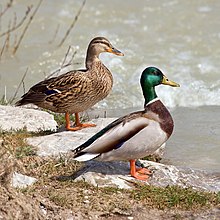Balut (food)
Balut (/bəˈluːt/ bə-LOOT, /ˈbɑːluːt/ BAH-loot;[1] also spelled as balot) is a fertilized developing egg embryo that is boiled or steamed and eaten from the shell.A balut is a fertilized bird egg (usually a duck) which is incubated for a period of 14 to 21 days, depending on the local culture, and then steamed.A combination of savory, gamey, and rich characteristics can be found in the flavor, which makes it an acquired taste that many Filipinos treasure as a culinary treat and a part of their culture.In order for the embryo to develop normally, it must be exposed to heat for the correct period of time, while ensuring that the temperature is not too hot to harm the eggs or too cold to permit growth.In the Vietnamese version, trứng vịt lộn, the egg is incubated for 19 to 21 days, when the embryo is old enough to be recognizable as a baby duck and has bones that will be firm but tender when cooked."[10] During this cooking process, changes occur in the food chemistry of balut, such as the sol dispersion of water molecules within the embryonic fluid.Balut nutrition specifications between chicken and duck have minor differences, but both eggs have around 14 grams of crude protein, 188 calories each, and around 100 milligrams of calcium.The broth surrounding the embryo is sipped from the egg before the shell is peeled, and the yolk and young chick inside can be eaten.In the Philippines, balut have recently entered haute cuisine by being served as appetizers in restaurants, cooked adobo style, fried in omelettes, or even used as filling in baked pastries.Balut is consumed in high amounts within countries in Southeast Asia, including Laos, Cambodia, Vietnam, Thailand, and the Philippines.A reason it may not be found or consumed as frequently in North America is that the majority of people outside of Southeast Asia still recognize balut as a novel and taboo food and often are anxious about trying it.[18] In the Philippines, balut is often eaten with salt or a chili, garlic and vinegar (white or coconut sap) mixture to season, depending on personal preference.Both Judaism and Islam have strict prohibitions on consuming food that is prepared in manners incompatible with religiously prescribed dietary laws.Bird embryos that have reached greater than 50% of their incubation have developed a neural tube sufficient for pain perception; therefore, they should be euthanized by similar methods used in avian neonates such as anesthetic overdose, decapitation, or prolonged exposure to carbon dioxide.The RSPCA Australia recommends against boiling the duck embryo from the 18th day of incubation onwards due to the potential for suffering beyond that point, and notes that it is "an area that is yet to be further researched".[32] A petition has been raised to get 5,000 signatures to have balut labeled "fertilized duck egg with embryo" and taken off the menu in the Maharlika restaurant, New York.[28] The incubation temperatures and environment required for the proper development of balut during processing are ideal growth conditions for many bacteria including Salmonella enteritidis.The CCA chefs, headed by Tristan Encarnacion, prepared 1,000 pieces of balut into an adobo dish that was recorded to have weighed 117.5 kilograms.The resulting dish was enjoyed by the townsfolk in a symbolic boodle fight, with tables topped with banana leaves stretching along B. Morcilla Street.



PhilippinesMallard ducksdevelopingembryostreet foodCambodiaVietnamVietnameseromanizedmallardFilipinosfood chemistrysol dispersionhaute cuisineomelettespastrieslaksa leafChinesepinyinmechanizedUnited StatesFilipino cuisinescrambled eggsvinegarJudaismneural tubecarbon dioxideRSPCA AustraliaSalmonella enteritidispathogensBizarre Foods with Andrew ZimmernFear FactorHell's KitchenThe Amazing Race Asia 2The Amazing Race Australia 2The Amazing Race UkraineCenter for Culinary Arts (CCA, Manila)History ChannelPaterosboodle fightBalut (game)Century eggKikiamKutti piKwek-KwekSalted duck eggSmoked eggSoy eggTea eggAmerican Veterinary Medical AssociationDavidson, AlanOxford Companion to FoodOxford University PressWayback MachineYouTubeList of egg topicsMonotremeFossil recordCephalopodReptiledinosaurPathologyAllergyEgg cellIchthyoplanktonOogamyOogenesisOothecaOviductOviparityOvoviviparityOvulationTrophicZygotemembraneChalazaAs foodList of egg dishesBenedictBoiledCenturyCoddledCustard dessertsDeep friedDeviledEggnogMeringueOmeletteOnsen tamagoPoachedPowderedPickledQuicheSaltedScotchScrambledShirredSmokedSouffléBalancingCartonDecoratingEaster eggEgg-and-spoon raceEgg drop competitionEggingFabergé eggFree rangeHowToBasicHumpty DumptyOologyOomancyOrganicOvo vegetarianismPysankaVegreville eggRollingTappingTossing